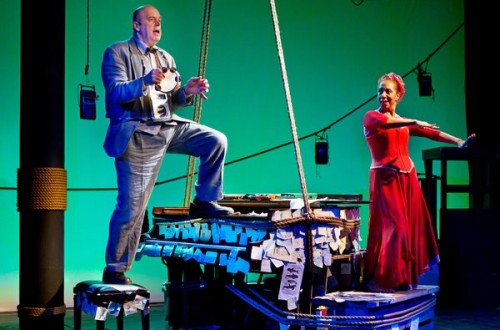Rinde Eckert Creates Melville's Great Whale
A Classic Opera out of Pittsfield into New York
By: Susan Hall - Mar 22, 2012
And God Created Great Whales
By and with Rinde Eckert
Nora Cole, Olivia
The Culture Project
New York
performances through March 25
Herman Melville was living in Pittsfield when he wrote Moby Dick. Melville's struggles as he wrote are described in a letter to Bostonian Richard Dana, the author of Two Years before the Mast: "I am half way in the work ...It will be a strange sort of book, tho', I fear; blubber is blubber you know; tho' you might get oil out of it, the poetry runs as hard as sap from a frozen maple tree; — and to cook the thing up, one must needs throw in a little fancy, which from the nature of the thing, must be ungainly as the gambols of the whales themselves. Yet I mean to give the truth of the thing, spite of this."
To his friend, Nathanlel Hawthorne in Lenox, he sent a quote about the Biblical Ahab; "And when that wicked King (Ahab)was killed, the dogs, did not they lick his blood?"
After its publication, a New York newspaper headlined Herman Melville Crazy.
Rinde Eckert's opera/performance piece, And God Created Great Whales, is being revived by the Culture Project at 45 Bleeker Street in New York. The rich stew on stage is not only an opera in the making, but a person's struggle, soothed only by a Muse, to create against the ravages of time and the isolation of writing, Eckert perfectly understands what he has to tell the audience to draw them in. We are told the author/composer Nathan is losing his memory or perhaps his mind, like Ahab. He is wokring on an opera. A piano center stage is covered with notes. Nathan is instructed to use each of five tape recorders for its special purpose.
Eckert was assigned the task of writing an opera based on Moby Dick in 1997. He has put together a triple layered extravaganeza, eye-socking visuals, songs in many different styles, including a rendition of Shenandoah in a high-pitched falsetto, rendered by Pip, a black boy from Tolland County, Connecticut who is over tender-hearted and really very bright. There is also and primarily the struggle of Nathan to compose an opera as his mind is leaving him. Nathan composing creates not only Pip, but Ahab and Ishmael.
Before the World Trade Center Towers collapsed, Eckert presciently described jumping off a tall building. These are now the first lines quoted from the play. Eckert speculated ex prior facto what good might come from the terror and panic such an event might elicit.
Moby Dick, of course, is not about the great whale but rather about Ahab, whose leg the whale bit off and about his relentless pursuit to avenge the act. Since the opera about the ultimate impact of love and hate, the US has acted out of fear and hate. And God Created Great Whales is still of critical relevance, as is our reaction or over reaction to a small band of radical men, clever and evil to be sure, with two hundred thousand dollars in their pockets to rent motel rooms and enroll in flight courses.
Nathan's muse played by Nora Cole, has ideas which are sometimes accepted and at other not. When she sings a forgiving and inclusive aria, "...all is welcome save the shadows oft things and vain regret," she is immediately rebuffed by Nathan: The dark woman who would sing this aria does not belong. "It's a whaling ship, for God's sake. It's not a magical place. It's a bloody business...There are no sculpted women appearing in the dark with prayers or promises." In the end, the Muse, a Baroque angel, pulls Ishmael from the deep for partial redemption.
Jake Heggae, post Eckert, wrote an opera based on the book. It is light by comparison, and even though it more literally tells the tale, it is neither as operatic, nor as true to the underlying work. The difference between the 'opera' and Eckert and Nathan's opera is that in Eckert's small-scaled piece you never feel that Moby Dick has been pared down. Truly a remarkable accomplishment and thoroughly engaging theater.
Fusing his Muse and the artistic angel he wrestles with, Eckert has written an opera that talks to our own age through the intense images and characters of Melville's book. His mediation on "what if you jumped from a tall building" brings terror to the present. Nathan seeks "ecstasy in the fury of the thing." While Ahab never reaches this place, both Nathan and Eckert's opera do. It is difficult to convey how profoundly entertaining And God Created Great Whales is.
Eckert is in residency at Wesleyan in Middletown, Connecticut after he finishes this run and again in May.


